Belarusians in Ukraine are the third biggest minority after Russians. Unlike many other ethnic groups, Belarusians do not have any particular concentration in the country, but spread out relatively evenly across all regions.

The People's Militia of the Donetsk People's Republic and People's Militia of the Luhansk People's Republic are pro-Russian paramilitaries in the Donbas region of eastern Ukraine, under the overall control of the Russian Federation. They are also referred to as Russian separatist forces or Russian proxy forces. They were affiliated with the self-declared Donetsk People's Republic (DPR) and Luhansk People's Republic (LPR) during the war in Donbas (2014–2022), the first stage of the Russo-Ukrainian War. They then supported the Russian Armed Forces against the Ukrainian Armed Forces during the 2022 Russian invasion. In September 2022, Russia annexed the DPR and LPR, and began integrating the paramilitaries into its armed forces. They are designated as terrorist groups by the government of Ukraine.

The 2nd Battalion of Special Assignment "Donbas" is a unit of the National Guard of Ukraine subordinated to the Ministry of Internal Affairs of Ukraine and based in Severodonetsk. Originally created in 2014 as a volunteer unit called the Donbas Battalion by Semen Semenchenko following the Russian occupation of Crimea and possible invasion of continental Ukraine. The formation of the unit started in the spring of 2014 during the 2014 pro-Russian unrest in Ukraine. The unit was initially formed as an independent force, but has been since fully integrated into the National Guard as the 2nd Special Purpose Battalion "Donbas" within the 15th Regiment of the National Guard.

Semen Ihorovych Semenchenko is a former deputy to the Verkhovna Rada of Ukraine, First Deputy Chairperson of the Verkhovna Rada of Ukraine Committee on National Security and Defence and the commander-founder of the volunteer territorial defence battalion "Donbas", based in Donetsk. He was a deputy of the Verkhovna Rada from 2014 to 2019.
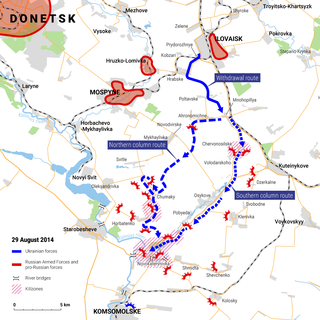
The Battle of Ilovaisk started on 7 August 2014, when the Armed Forces of Ukraine and pro-Ukrainian paramilitaries began a series of attempts to capture the city of Ilovaisk from pro-Russian insurgents affiliated with the Donetsk People's Republic (DPR) and detachments of the Russian Armed Forces. Although Ukrainian forces were able to enter the city on 18 August, they were encircled between 24 and 26 August by overwhelming Russian military forces that crossed the border, joining the battle. After days of encirclement, Ukrainian forces rejected the DPR's proposal to open a humanitarian corridor on the condition that they abandon their armored vehicles and ammunition, and on the morning of 29 August 2014 began to leave Ilovaisk with their weapons. The Russian side opened fire on the evacuating Ukrainian soldiers, many of whom died whilst trying to escape.

The Sich Battalion, officially known as the 4th Sich Company of the Kyiv Regiment, is a Ukrainian special police battalion consisting of volunteers from Kyiv. The unit was formed in June 2014 by volunteers from the far-right party Svoboda at the start of the war in Donbas.
Isa Akhyadovich Munayev was a Chechen rebel and military commander who fought for the independence of the Chechen Republic of Ichkeria from Russia until he was forced into exile in Europe around 2004. He was killed in action while leading a Chechen volunteer unit on the Ukrainian side during the war in Donbas in 2015.

The Right SectorUkrainian Volunteer Corps or simply the Ukrainian Volunteer Corps, was the paramilitary arm of right-wing Ukrainian nationalist party Right Sector. The Ukrainian Volunteer Corps was founded on July 17, 2014, as one of the "volunteer battalions", created as a response to the rise of pro-Russian separatism and the Russian intervention in the war in Donbas.

Ukrainian volunteer battalions were militias and paramilitary groups mobilized as a response to the perceived state of weakness and unwillingness of the regular Armed Forces to counter rising separatism in spring 2014. They trace their origins to the "Maidan Self-Defense" militias formed during the Euromaidan in 2013. The earliest of these volunteer units were later formalized into military, special police and paramilitary formations in a response to the Russian military intervention in Ukraine. Most of the formations were formed or placed under command of the Ministry of Internal Affairs — as "Special Tasks Patrol Police" — and Ministry of Defence — as "Territorial defence battalions". A minority of battalions were independent of state control.

The Wagner Group, officially known as PMC Wagner and as the Africa Corps in Africa, is a Russian state-funded private military company (PMC) controlled until 2023 by Yevgeny Prigozhin, a former close ally of Russia's president Vladimir Putin. The Wagner Group has used infrastructure of the Russian Armed Forces. Evidence suggests that Wagner has been used as a proxy by the Russian government, allowing it to have plausible deniability for military operations abroad, and hiding the true casualties of Russia's foreign interventions.
The combatants of the war in Donbas included foreign and domestic forces.

Tactical Group "Belarus" is a group of volunteers from Belarus who were involved in the Donbas war. They fought on the side of Ukraine, first as part of the Right Sector Ukrainian Volunteer Corps, and later as part of various formations of the Ukrainian volunteer battalions and the Armed Forces of Ukraine.

Belarus, a close ally of Russia, has supported its eastern neighbour in the Russian invasion of Ukraine. Before the start of the offensive, Belarus allowed the Russian Armed Forces to perform weeks-long military drills on its territory; however, the Russian troops did not exit the country after they were supposed to finish. Belarus allowed Russia to stage part of the invasion from its territory, giving Russia the shortest possible land route to Ukraine's capital, Kyiv. However, these forces withdrew within two months, thus ceasing land-based military operations originating from Belarus and resulting in the recapture of the Ukrainian side of the border region by Ukraine. Despite this, the situation along the border remains tense, with Ukraine closing the border checkpoints leading into Belarus, bar special cases.
The Russo-Ukrainian War has seen foreign volunteers participate on both sides of the conflict. Most foreign fighters joined the conflict during one of two waves. The first wave happened from 2014 to 2019 during the War in the Donbas and consisted of approximately 17,241 foreign fighters. The second wave is considered by researchers to have been much larger and began in 2022 after the Russian invasion of Ukraine.
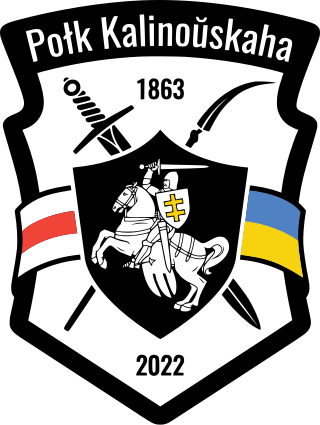
The Kastuś Kalinoŭski Regiment is a group of Belarusian opposition volunteers, which was formed to defend Ukraine against the 2022 Russian invasion.
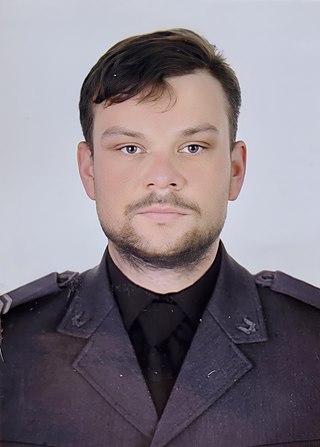
Aliaksiej Mikalajevič Skoblia, nom de guerre "Tur", was a Belarusian soldier who was deputy commander of the Kastuś Kalinoŭski Battalion under the Armed Forces of Ukraine. Skoblia died defending Kyiv from advancing Russian troops during the Battle of Kyiv in the 2022 Russian invasion of Ukraine. He was posthumously conferred the title of Hero of Ukraine by President of Ukraine Volodymyr Zelenskyy.

Oleksii Oleksandrovych Seniuk was a Ukrainian veteran of the Russo-Ukrainian War. He was killed by Russian Armed Forces in the Siege of Chernihiv on 27 February 2022 during the Russian invasion of Ukraine. He was posthumously awarded the Order of Gold Star.
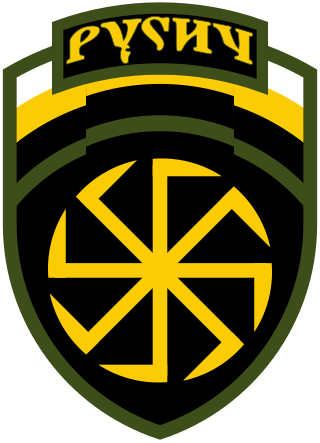
The Sabotage Assault Reconnaissance Group(DShRG) "Rusich" is a Russian far-right and neo-Nazi paramilitary unit that has been fighting against Ukrainian forces in the Russo-Ukrainian War. Its co-founder and leader is Alexey Milchakov and operates within the Wagner Group. "Rusich" fought on the side of pro-Russian military in the Donbas war from June 2014 to July 2015, and in the Russian invasion of Ukraine alongside Russian troops.
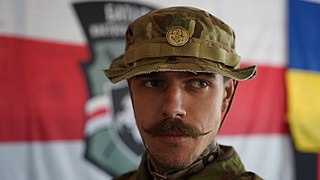
Dzianis Prokharaŭ, nom de guerre "Kit", is a Belarusian soldier who serves as the commander of the Kastuś Kalinoŭski Regiment under the Armed Forces of Ukraine.















